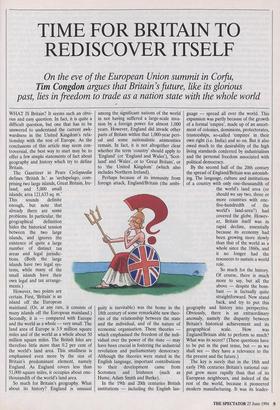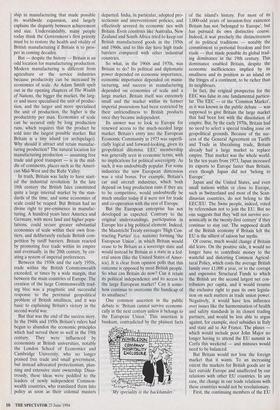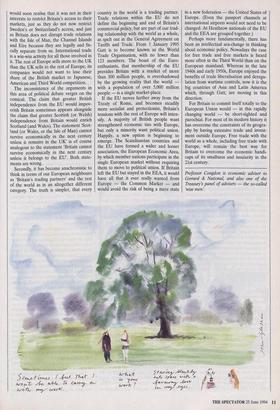TIME FOR BRITAIN TO REDISCOVER ITSELF
On the eve of the European Union summit in Corfu,
Tim Congdon argues that Britain's future, like its glorious
past, lies in freedom to trade as a nation state with the whole world
WHAT IS Britain? It seems such an obvi- ous and easy question. In fact, it is quite a difficult question, but one that has to be answered to understand the current awk- wardness in the United Kingdom's rela- tionship with the rest of Europe. As the conclusions of this article may seem con- troversial, the best way to start may be to offer a few simple statements of fact about geography and history which try to define Britain.
geographical definition hides the historical tension between the two large islands, and ignores the existence of quite a large number of distinct tax areas and legal jurisdic- tions. (Both the large islands have two legal sys- tems, while many of the small islands have their own legal and tax arrange- ments.) However, two points are certain. First, 'Britain' is an island off the European mainland. (Or, at any rate, it consists of many islands off the European mainland.) Secondly, it is — compared with Europe and the world as a whole — very small. The land area of Europe is 3.9 million square miles and of the world as a whole about 50 million square miles. The British Isles are therefore little more than 0.2 per cent of the world's land area. This smallness is emphasised even more by the size of Britain's predominant element, namely England. As England covers less than 51,000 square miles, it occupies about one- thousandth of the world's land area.
So much for Britain's geography. What about its history? England is unusual among the{ `significant nations of the world in not having suffered a large-scale inva- sion by a foreign power for almost 1,000 years. However, England did invade other parts of Britain within that 1,000-year peri- od and some nationalistic animosities remain. In fact, it is not altogether clear whether the term 'country' should apply to `England' (or 'England and Wales'), 'Scot- land' and 'Wales', or to 'Great Britain', or to 'the United Kingdom' (which also includes Northern Ireland).
Perhaps because of its immunity from foreign attack, England/Britain (the ambi- guity is inevitable) was the home in the 18th century of some remarkable new theo- ries of the relationship between the state and the individual, and of the nature of economic organisation. These theories which emphasised the freedom of the indi- vidual over the power of the state — may have been crucial in fostering the industrial revolution and parliamentary democracy. Although the theories were stated in the English language, important contributions to their development came from Scotsmen and Irishmen (such as Hume, Adam Smith and Burke).
In the 19th and 20th centuries British institutions — including the English Ian- guage — spread all over the world. This expansion was partly because of the growth of a formal 'empire', made up of an assort- ment of colonies, dominions, protectorates, trusteeships, so-called 'empires' in their own right (i.e. India) and so on. But it also owed much to the desirability of the high living standards conferred by industrialism and the personal freedom associated with political democracy.
By the second half of the 20th century the spread of England/Britain was astonish- ing. The language, culture and institutions of a country with only one-thousandth of the world's land area (or should we say two, three or more countries with one- five-hundredth of the world's land-area?) had covered the globe. Howev- er, Britain itself was in rapid decline, essentially because its economy had been growing more slowly than that of the world as a whole since the 1860s, and it no longer had the resources to sustain a world role.
geographical scale. How was England/Britain able to perform so much? What was its secret? (These questions have to be put in the past tense, but — as we shall see — they have a relevance to the the present and the future.) The key is surely that in the 18th and early 19th centuries Britain's national out- put grew more rapidly than that of its European neighbours, and indeed of the rest of the world, because it pioneered modern manufacturing. It was its leader- ship in manufacturing that made possible its worldwide expansion, and largely explains the disparity between achievement and size. Understandably, many people today think the Government's first priority must be to restore the health and vitality of British manufacturing if Britain is to pros- per in coming decades.
But — despite the history — Britain is an odd location for manufacturing production. Modern manufacturing is different from agriculture or the service industries because productivity can be increased by economies of scale. As Adam Smith spelt out in the opening chapters of The Wealth of Nations, the bigger the market, the larg- er and more specialised the unit of produc- tion, and the larger and more specialised the unit of production, the higher is the productivity per man. Economies of scale can be secured only by long production runs, which requires that the product be sold into the largest possible market. But Britain is a tiny island (or archipelago). Why should it attract and retain manufac- turing production? The natural location for manufacturing production — assuming free trade and good transport — is in the mid- dle of continents, places such as the Ameri- can Mid-West and the Ruhr Valley.
In truth, Britain was lucky to have start- ed the industrial revolution. In the late 18th century the British Isles constituted quite a large internal market by the stan- dards of the time, and some economies of scale could be reaped. But Britain had no divine right to pre-eminence in manufac- turing. A hundred years later America and Germany, with more land and higher popu- lations, could secure greater substantial economies of scale within their own fron- tiers, and deliberately exclude British com- petition by tariff barriers. Britain reacted by promoting free trade within its empire and eventually, in the 20th century, by cre- ating a system of imperial preferences.
Between the 1930s and the early 1950s, trade within the British Commonwealth exceeded, at times by a wide margin, that between the main countries of Europe. The creation of the large Commonwealth trad- ing bloc was a pragmatic and successful response to the perennial geopolitical problem of British smallness, and it was basic to explaining Britain's victory in the second world war.
But that was the end of the success story. In the 1940s and 1950s Britain's rulers had begun to abandon the economic principles which had served them so well in the 19th century. They were influenced by economists at British universities, notably the London School of Economics and Cambridge University, who no longer praised free trade and small government, but instead advocated protectionism, plan- ning and extensive state ownership. Disas- trously, these ideas were peddled to the leaders of newly independent Common- wealth countries, who translated them into policy as soon as their colonial masters departed. India, in particular, adopted pro- tectionist and interventionist policies, and effectively severed its economic ties with Britain. Even countries like Australia, New Zealand and South Africa tried to keep out British manufactured goods in the 1950s and 1960s, and to this day have high trade barriers compared with other industrial countries.
So what, in the 1960s and 1970s, was Britain to do? Its political and diplomatic power depended on economic importance, economic importance depended on manu- tacturing, and success in manufacturing depended on economies of scale and a large market. Britain itself was extremely small and the market within its former imperial possessions had been restricted by their unfriendliness to British products once they became independent.
Its answer was to look to Europe for renewed access to the much-needed large market. Britain's entry into the European Economic Community in 1973 was superfi- cially logical and forward-looking, given its geopolitical dilemma. EEC membership was generally seen in economic terms, with no implications for political sovereignty. As such, it was undoubtedly popular. For some industries the new European dimension was a vital bonus. For example, Britain's car and aircraft industries, which both depend on long production runs if they are to be competitive, would undoubtedly be much smaller today if it were not for trade and co-operation with the rest of Europe.
But the European enterprise has not developed as expected. Contrary to the original understandings, participation in Europe has a big political element. Indeed, the Maastricht Treaty envisages 'High Con- tracting Parties' (i.e. nations) forming 'the European Union', in which Britain would cease to be Britain as a sovereign state and would instead be Britain as a state in a fed- eral union (like the United States of Amer- ica). It is clear from opinion polls that this outcome is opposed by most British people. So what can Britain do now? Can it retain its political independence and its access to the large European market? Can it some- how continue to overcome the handicap of its smallness?
One common assertion in the public debate is: 'Britain cannot survive economi- cally in the next century unless it belongs to the European Union.' This assertion is bunkum, contradicted by the plainest facts 'My speciality is the backhander.' of the island's history. For most of its 1,000-odd years of invasion-free existence Britain has not 'belonged to Europe', but has pursued its own distinctive course. Indeed, it was precisely the distinctiveness of its political traditions — notably the commitment to personal freedom and free trade — that made possible its global trad- ing dominance in the 19th century. This dominance enabled Britain, despite the economic inefficiencies implied by its smallness and its position as an island on the fringes of a continent, to be richer than its neighbours.
In fact, the original prospectus for the EEC was false in one fundamental particu- lar. The EEC — or the 'Common Market', as it was known in the public debate — was supposed to give Britain the large market that had been lost with the dissolution of empire. But, by the early 1970s, Britain had no need to select a special trading zone on geopolitical grounds. Because of the suc- cess of the General Agreement on Tariffs and Trade in liberalising trade, Britain already had a large market to replace empire. That market was the whole world. In the ten years from 1973, Japan increased its exports to Europe faster than Britain, even though Japan did not 'belong to Europe'.
Japan and the United States, and even small nations within or close to Europe, such as Switzerland and most of the Scan- dinavian countries, do not belong to the EEC/EU. The Swiss people, indeed, voted by referendum not to join the EU. But no one suggests that they 'will not survive eco- nomically in the twenty-first century' if they continue to stay out. The supposed death of the British economy if Britain left the EU is the silliest of saloon bar myths.
Of course, much would change if Britain did leave. On the positive side, it would no longer have to contribute money to the wasteful and distorting Common Agricul- tural Policy, which costs the average British family over £1,000 a year, or to the corrupt and expensive Structural Funds to which the British are the second largest net con- tributors per capita, and it would resume the exclusive right to pass its own legisla- tion on such matters as trade union power. Negatively, it would have less influence over issues like the harmonisation of health and safety standards in its closest trading partners, and would be less able to argue against, for example, steel subsidies in Italy and state aid to Air France. The pluses which would include poor John Major no longer having to attend the EU summit in Corfu this weekend — and minuses would need to be balanced.
But Britain would not lose the foreign market that it wants. To an increasing extent the markets for British goods are in fact outside Europe and unaffected by our relations with other EU countries. In any case, the change in our trade relations with these countries would not be revolutionary.
First, the continuing members of the EU would soon realise that it was not in their interests to restrict Britain's access to their markets, just as they do not now restrict Sweden's or Switzerland's access, and just as Britain does not disrupt trade relations with the Isle of Man, the Channel Islands and Eire because they are legally and fis- cally separate from us. International trade is a win-win activity for all those involved in it. The rest of Europe sells more to the UK than the UK sells to the rest of Europe; its companies would not want to lose their share of the British market to Japanese, American and Third World competition.
The inconsistency of the arguments in this area of political debate verges on the comical. The claim that greater British independence from the EU would impov- erish Britain sometimes appears alongside the claim that greater Scottish (or Welsh) independence from Britain would enrich Scotland (and Wales). The statement 'Scot- land (or Wales, or the Isle of Man) cannot survive economically in the next century unless it remains in the UK' is of course analogous to the statement 'Britain cannot survive economically in the next century unless it belongs to the EU'. Both state- ments are wrong. Secondly, it has become anachronistic to think in terms of our European neighbours as 'Britain's trading partners' and the rest of the world as in an altogether different category. The truth is simpler, that every country in the world is a trading partner. Trade relations within the EU do not define the beginning and end of Britain's commercial policy, but are part of our trad- ing relationship with the world as a whole, as spelt out in the General Agreement on Tariffs and Trade. From 1 January 1995 Gatt is to become known as the World Trade Organisation, with no fewer than 123 members. The boast of the Euro- enthusiasts, that membership of the EU provides Britain with a market of more than 300 million people, is overshadowed by the growing reality that the world with a population of over 5,000 million people — is a single market-place.
If the EU moves further away from the Treaty of Rome, and becomes steadily more socialist and protectionist, Britain's tensions with the rest of Europe will inten- sify. A majority of British people want strengthened economic ties with Europe, but only a minority want political union. Happily, a new option is beginning to emerge. The Scandinavian countries and the EU have formed a wider and looser association, the European Economic Area, by which member nations participate in the single European market without requiring them to move to political union. If Britain left the EU but stayed in the EEA, it would have all that it ever really wanted from Europe — the Common Market — and would avoid the risk of being a mere state in a new federation — the United States of Europe. (Even the passport channels at international airports would not need to be changed. At Heathrow nationals of the EU and the EEA are grouped together,) Perhaps more fundamentally, there has been an intellectual sea-change in thinking about economic policy. Nowadays the case for free trade and free markets is heard more often in the Third World than on the European mainland. Whereas in the late 1940s and early 1950s, Europe enjoyed the benefits of trade liberalisation and deregu- lation from wartime controls, now it is the big countries of Asia and Latin America which, through Gatt, are moving in this direction.
For Britain to commit itself totally to the European Union would — in this rapidly changing world — be short-sighted and parochial. For most of its modern history it has overcome the constraints of its geogra- phy by having extensive trade and invest- ment outside Europe. Free trade with the world as a whole, including free trade with Europe, will remain the best way for Britain to overcome the economic handi- caps of its smallness and insularity in the 21st century.
Professor Congdon is economic adviser to Gerrard & National, and also one of the Treasury's panel of advisers — the so-called `wise men'.


































































 Previous page
Previous page